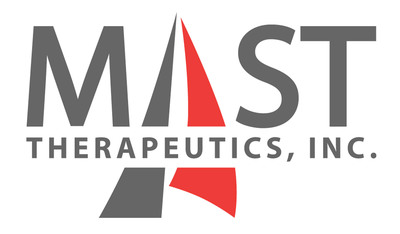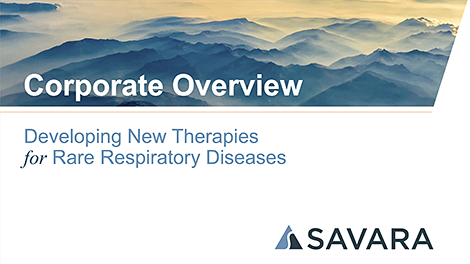SAN DIEGO, Aug. 8, 2016 /PRNewswire/ -- Mast Therapeutics, Inc. (NYSE MKT: MSTX), a biopharmaceutical company developing novel, clinical-stage therapies for sickle cell disease and heart failure, today reported that it received a Small Business Innovation Research (SBIR) grant from the National Institute Of Neurological Disorders And Stroke (NINDS) of the National Institutes of Health (NIH). The grant will support investigation of the Company's lead product candidate, vepoloxamer, in combination with tissue plasminogen activator (tPA) in experimental models of embolic stroke. Mast will collaborate on the grant with leading stroke researchers at the Neuroscience Institute at Henry Ford Health System.
"Acute stroke is one of the leading causes of death in the U.S. and represents an important unmet medical need. We are excited about the potential for vepoloxamer in this indication and gratified that the NINDS has awarded us this grant to further its development," stated Brian M. Culley, Chief Executive Officer of Mast Therapeutics.
"Our initial data suggest vepoloxamer accelerates opening of occluded vessels and expands the therapeutic window for treatment with tPA in experimental models of acute stroke," stated R. Martin Emanuele, Ph.D., Senior Vice President, Development of Mast Therapeutics and Principal Investigator of the study to be supported by the SBIR grant. "This grant will further understanding of these potential benefits of vepoloxamer with an eye toward future clinical studies," continued Dr. Emanuele.
About Mast Therapeutics
Mast Therapeutics, Inc. is a publicly traded biopharmaceutical company headquartered in San Diego, California. The Company is developing two clinical-stage investigational new drugs for serious or life-threatening diseases and conditions. Vepoloxamer, the Company's lead product candidate, is in Phase 3 clinical development for the treatment of vaso-occlusive crisis in patients with sickle cell disease and in Phase 2 clinical development for the treatment of patients with heart failure. Enrollment in the Company's 388-patient Phase 3 study of vepoloxamer in patients with sickle cell disease, known as the EPIC study, was completed earlier this year. Enrollment in the Company's Phase 2 study of vepoloxamer in patients with chronic heart failure is ongoing. AIR001, the Company's second product candidate, is in Phase 2 clinical development for the treatment of patients with heart failure with preserved ejection fraction (HFpEF). Enrollment in Phase 2 studies of AIR001 in patients with HFpEF are ongoing, including a 100-patient, multicenter, randomized, double-blind, placebo-controlled, Phase 2 study in patients with HFpEF being conducted by the Heart Failure Clinical Research Network. More information can be found on the Company's web site at www.masttherapeutics.com. (Twitter: @MastThera)
Mast Therapeutics™ and the corporate logo are trademarks of Mast Therapeutics, Inc.
About the SBIR Grant
The Small Business Innovation Research (SBIR) program is a highly competitive program that encourages domestic small businesses to engage in research and development that has the potential for commercialization. Through a competitive awards-based program, SBIR enables small businesses to explore their technological potential and provides the incentive to profit from its commercialization. The grant to Mast Therapeutics (Award Number R43NS098822) was awarded by the National Institute Of Neurological Disorders And Stroke of the NIH. The research to be conducted by this grant is solely the responsibility of Mast Therapeutics and the study investigators and any reported outcomes do not necessarily represent the official views of the NIH.
Forward Looking Statements
Mast Therapeutics cautions you that statements included in this press release that are not a description of historical facts are forward-looking statements within the meaning of the Private Securities Litigation Reform Act of 1995 that are based on the Company's current expectations and assumptions. Such forward-looking statements may be identified by the use of forward-looking words such as "expect," "intend," "plan," "anticipate," "believe," among others, and include, but are not limited to, statements relating to prospects for successful development of vepoloxamer as a treatment for stroke. There are a number of factors that could cause or contribute to material differences between actual events or results and the expectations indicated by the forward-looking statements. These factors include, but are not limited to: the inherent uncertainty of outcomes in ongoing and future studies of the Company's product candidates and the risk that vepoloxamer may not demonstrate adequate safety, efficacy or tolerability in one or more such studies; risks associated with the Company's ability to manage operating expenses and obtain additional capital as needed; the Company's potential inability to continue as a going concern if it does not raise sufficient additional capital as needed; the risk that the Company may be required to repay its outstanding debt obligations on an accelerated basis and/or at a time that could be detrimental to its financial condition, operations and/or business strategy, including the prepayment of $10 million of the principal balance of its debt facility if results from the EPIC study are not positive and/or not available on or before October 14, 2016; the potential for the Company to significantly delay, reduce or discontinue current and/or planned development and commercial-readiness activities or sell or license its assets at inopportune times if it is unable to raise sufficient additional capital as needed; delays in the commencement or completion of clinical studies, including as a result of difficulties in obtaining regulatory agency agreement on clinical development plans or clinical study design, opening trial sites, enrolling study subjects, manufacturing sufficient quantities of clinical trial material, being subject to a "clinical hold," and/or suspension or termination of a clinical study, including due to patient safety concerns or lack of funding; the potential that, even if clinical studies of a product candidate in one indication are successful, clinical and nonclinical studies in another indication may not be successful; the Company's dependence on third parties to assist with important aspects of development of its product candidates, including conduct of its clinical studies and supply and manufacture of clinical trial material, and, if approved, commercial product, and the risk that such third parties may fail to perform as expected, leading to delays in product candidate development or approval or inability to meet market demand for approved products, if any; the risk that, even if the Company successfully develops a product candidate in one or more indications, it may not realize commercial success and may never achieve profitability; the risk that the Company is not able to obtain and maintain effective patent coverage or other market exclusivity protections for its products, if approved, without infringing the proprietary rights of others; and other risks and uncertainties more fully described in the Company's press releases and periodic filings with the Securities and Exchange Commission. The Company's public filings with the Securities and Exchange Commission are available at www.sec.gov.
You are cautioned not to place undue reliance on forward-looking statements, which speak only as of the date when made. Mast Therapeutics does not intend to revise or update any forward-looking statement set forth in this press release to reflect events or circumstances arising after the date hereof, except as may be required by law.
Logo - http://photos.prnewswire.com/prnh/20120612/LA22456LOGO-a
To view the original version on PR Newswire, visit:http://www.prnewswire.com/news-releases/mast-therapeutics-awarded-small-business-innovation-research-grant-from-the-national-institutes-of-health-300310225.html
SOURCE Mast Therapeutics, Inc.
Mast Therapeutics, Ioana C. Hone (ir@mastthera.com), 858-552-0866 Ext. 303



